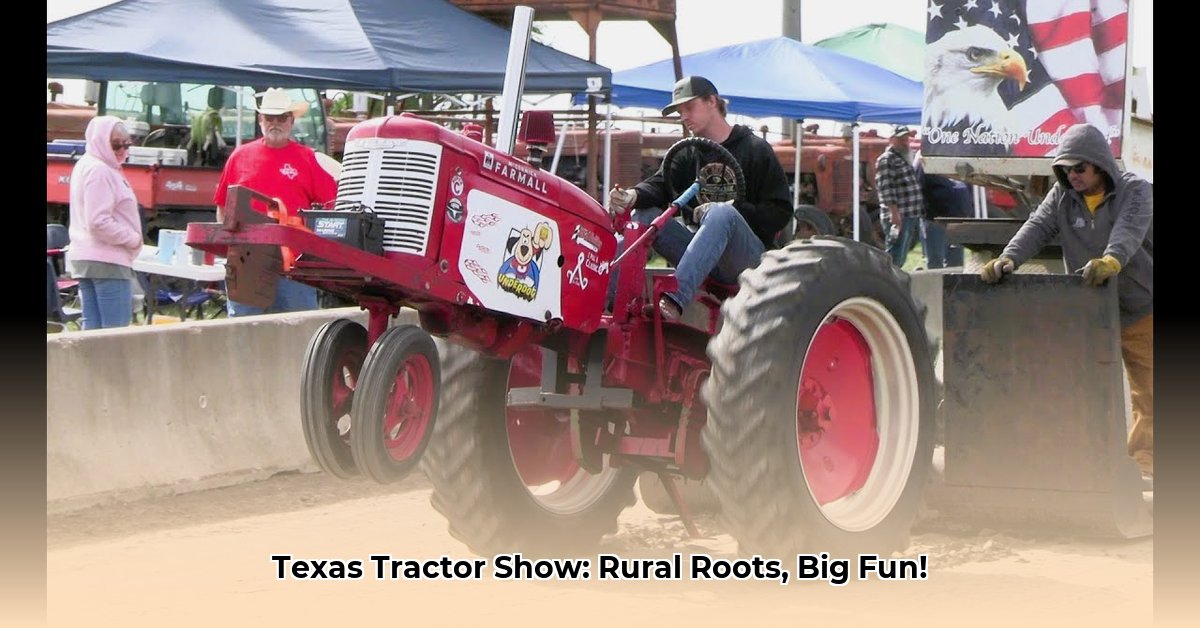
A Deep Dive into Texas Farming History
The Temple, Texas Tractor Show is far more than a simple display of vintage machinery; it's a vibrant tapestry woven from threads of Texas farming history, community spirit, and economic vitality. Each year, over 5,000 attendees gather, drawn together by a shared appreciation for the land and the ingenious iron workhorses that shaped it. This isn't just a show; it's a family reunion, a celebration of rural ingenuity, and a dynamic testament to the enduring spirit of Texas agriculture. But what truly sets this event apart? For more Texas tractor events, check out this useful resource.
Beyond the Gleaming Metal: A Journey Through Time
Forget static displays—this show is a journey into the past. While gleaming antique tractors are certainly a highlight (think meticulously restored John Deeres and Allis-Chalmers), the real magic lies in the immersive experience. Attendees witness demonstrations of traditional farming techniques like corn shelling and threshing, gaining firsthand insight into the hard work and innovation of generations past. The air hums with the energy of history, the scent of oil and freshly turned earth a tangible link to a bygone era. This multi-generational event engages everyone—children learn about food production's roots, adults reminisce about simpler times. "It's like stepping into a living history book," says Sarah Miller, a long-time attendee.
More Than Just a Show: Economic Impact and Community Spirit
The Temple Tractor Show isn't just a nostalgic spectacle; it's a significant economic driver for the local community. The influx of visitors boosts local businesses—food vendors, flea markets, hotels, and restaurants all experience a surge in activity. While precise economic data isn't readily available, the sheer volume of attendees strongly suggests a considerable positive impact. "The economic ripple effect of this event is substantial," notes Dr. Emily Carter, an economist at Baylor University. "It's a prime example of heritage tourism—a successful blend of history, recreation, and economic development."
Looking Ahead: Navigating Challenges and Embracing Opportunities
Despite its undeniable success, the show faces challenges to maintain its vibrancy. Attracting younger generations, integrating modern technologies to enhance the visitor experience, and securing dependable funding are key priorities. "We want to ensure the show remains relevant for future generations," explains John Smith, the show's organizer. One exciting avenue being explored is showcasing sustainable farming practices, demonstrating how traditional techniques inform modern agricultural approaches.
The Human Element: Stories That Endure
The heart of the show beats with the rhythm of human connection. This is where seasoned farmers recount their unforgettable experiences, families create lasting memories, and generations connect through a shared heritage. These stories, as powerful as the tractors themselves, form the show's living legacy. "It's the stories that truly make this event special," says David Jones, a third-generation farmer and regular participant. "They are tales of resilience, ingenuity, and the unwavering connection between people and the land."
A Legacy of the Land: Cultivating a Sustainable Future
The Temple Texas Tractor Show serves as a compelling model for preserving agricultural heritage while simultaneously fostering economic growth. By proactively addressing challenges and embracing innovative solutions, the show is poised for continued success. However, its longevity depends on unwavering community support, creative programming, and strategic planning. This continued success relies on a collaborative spirit. What role can you play in supporting this important event?
Working Together: A Collaborative Path Forward
The sustained success of the Temple Texas Tractor Show relies on a collaborative approach. Various stakeholders play a vital role:
Show Organizers: Improve data collection to better quantify economic impact and actively seek sponsorships. Long-term, they'll focus on developing educational programs and enhancing online promotion; sustainability plans are also crucial.
Local Businesses: Increase participation by offering event-specific packages and join in collaborative marketing initiatives. Long-term, they should invest in infrastructure to better support tourism.
Community Members: Volunteer time and spread the word. Long term, actively advocate for agricultural heritage and support local businesses.
Local Government: Provide financial and infrastructure support. Long term, develop strategies to promote rural tourism and secure funding for heritage projects.
Agricultural Historians: Document the show's history, conduct interviews, and create educational exhibits ensuring historical accuracy. Long-term efforts include creating an archive of photographs and recordings.
The Temple Texas Tractor Show is more than an event; it’s a powerful symbol of rural Texas, a celebration of our agricultural roots, and a testament to the enduring human spirit.